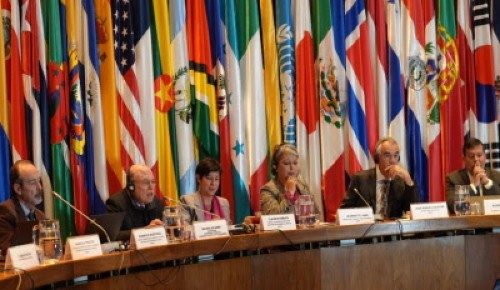SANTIAGO, Chile – The Executive Secretary of the Economic Commission for Latin America and the Caribbean (ECLAC), José Manuel Salazar-Xirinachs, says the LAC needs to comprehensively address at least five factors underlying social inequality in the region.
 The program points up thematic panels, three keynote speeches and three side events.Addressing the inaugural fourth Regional Seminar on Social Development on Social Protection and Inequality, titled “Social Protection and Inequality: Latin America and the Caribbean towards the Second World Summit for Social Development of 2025” Salazar-Xirinachs, said the countries in the region could start by increasing economic growth through new-generation productive development policies.
The program points up thematic panels, three keynote speeches and three side events.Addressing the inaugural fourth Regional Seminar on Social Development on Social Protection and Inequality, titled “Social Protection and Inequality: Latin America and the Caribbean towards the Second World Summit for Social Development of 2025” Salazar-Xirinachs, said the countries in the region could start by increasing economic growth through new-generation productive development policies.
The conference, which ends on Thursday, has brought together social development, social inclusion and labour ministers from the region, along with other government officials and academics and specialists.
As we have been saying, Latin America and the Caribbean is in a development crisis that is manifested in three traps: one involving low capacity for growth; another, high inequality and low social mobility and social cohesion; and a third involving weak institutional capacity and ineffective governance.
“This regional seminar seeks to delve deeper in assessments and proposals for breaking away from the core causes that determine, in particular, the trap of high inequality and low social mobility,” Salazar-Xirinachs said.
According to the UN official inequality has been at the center of ECLAC’s thinking and reflections over its 75 years in existence.
“Inequality not only goes against basic concepts of social justice, it is inefficient for growth and corrosive to social cohesion and the stability of social compacts.”
Salazar-Xirinachs said the five factors that the region must urgently address in order to make a real difference in terms of reducing inequality in Latin America and the Caribbean include the productive heterogeneity that characterizes the region’s countries and does not allow for creating quality employment for the majority of the population and the persistence of regressive tax systems and social and social protection policies of limited scope.
He said the still-insufficient coverage and low quality of education; gender inequality and the discrimination against and violations of the human rights of indigenous, Afro-descendent and other population groups are also among the factors.
“Low and mediocre growth rates make it very difficult, not to say impossible, to promote productive transformation, reduce poverty, reduce informality, create high-quality jobs and generate fiscal revenue for impactful social policies.
“All of this points to productive development policies being part of the solution to productive heterogeneity as a cause of income inequality, policies that would invigorate growth and reduce the major differences in productivity between sectors, that would reduce productive dualism and stimulate a structural shift in production and employment towards sectors and companies with higher productivity,” Salazar-Xirinachs said.
The regional event also featured remarks by Manfred Haebig, Principal Advisor of the ECLAC-BMZ/giz Cooperation Programme; Laura Oroz Ulibarri, Director of the Directorate of Cooperation with Latin America and the Caribbean at the Spanish Agency for International Development Cooperation (AECID); and Ximena Andión, Deputy Director at the Ford Foundation’s Mexico and Central America Office.
“I hope that this Fourth Regional Seminar on Social Development will contribute to analysis, debate and exchange so that the region’s countries can design and implement public policies to help make the triple transition, in the digital, ecological and socioeconomic realms, leaving no one behind,” Manfred Haebig said.
Laura Oroz Ulibarri said “the strategic partnership between AECID and ECLAC, which is already 30 years old,” and she announced that in a new phase of this collaboration, they will seek to contribute to strengthening the social institutional framework in the region in order to promote social cohesion policies centered on equality and on the effective enjoyment of rights.
Ximena Andión of the Ford Foundation also expressed appreciation for “the collaborative work we have done with ECLAC in recent years because, for us, ECLAC is an institution that has always been at the forefront of discussions on inequality,” and she agreed that this issue “runs North and South, very prominently affecting all the world’s countries, which means we must continue analyzing it from different perspectives.”
President of the United Nations Economic and Social Council (ECOSOC), Paula Narváez, in an address, urged convergence among the various multilateral processes underway that are focused on promoting social development in the world.
“The Second World Summit for Social Development, which will be held in 2025, is an important pillar in our collective efforts to create an impetus that would accelerate progress on implementation of the 2030 Agenda for Sustainable Development,” she said.
The first day of the regional seminar also featured the presentation of the book Non-contributory pension systems in Latin America and the Caribbean: Towards solidarity with sustainability, edited by Alberto Arenas de Mesa, Director of ECLAC’s Social Development Division, and Claudia Robles, a Social Affairs Officer from the same Division, in the framework of the ECLAC-BMZ/giz project entitled “Transformative reactivation: overcoming the consequences of the COVID-19 pandemic in Latin America and the Caribbean.”
“This is the first book published by ECLAC to be exclusively focused on the study of non-contributory pension systems in the region. This is fundamental because these systems constitute a basic pillar for achieving universal, comprehensive, sustainable and resilient social protection systems. In addition, these systems are essential for achieving inclusive social development,”Salazar-Xirinachs said.
According to the publication, non-contributory pension systems have experienced a truly remarkable increase in cove, or just over one million people, to covering 31 per cent of this population in 2022, or nearly 20 million people. In 2022, only five countries in the region lacked this type of system.


